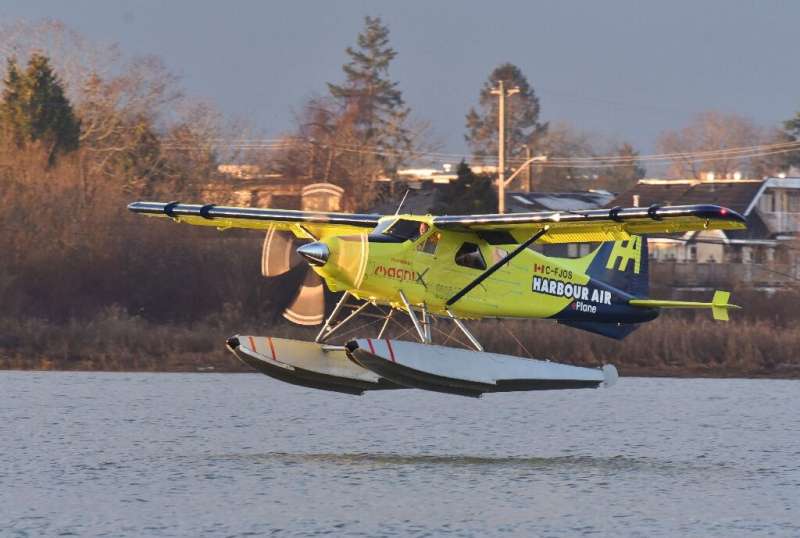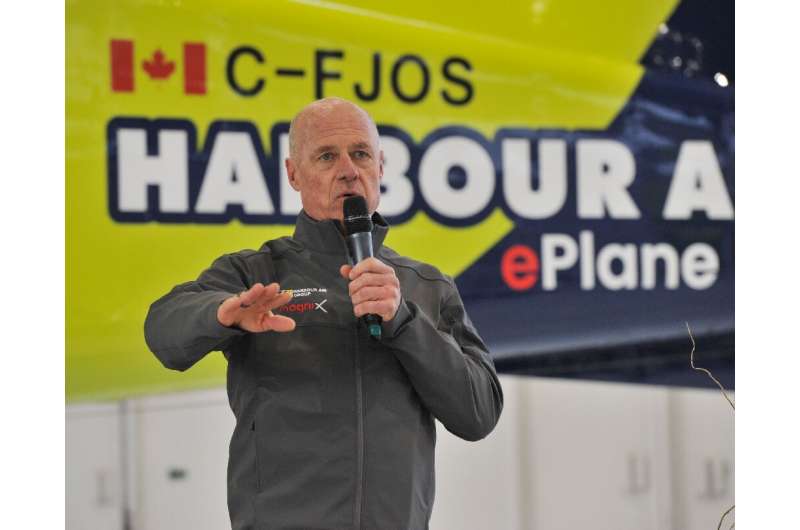First commercial electric plane takes flight in Canada

The world's first fully electric commercial aircraft took its inaugural test flight on Tuesday, taking off from the Canadian city of Vancouver and offering hope that airlines may one day end their polluting emissions.
"This proves that commercial aviation in all-electric form can work," said Roei Ganzarski, chief executive of Seattle-based engineering firm magniX.
The company designed the plane's motor and worked in partnership with Harbour Air, which ferries half a million passengers a year between Vancouver, Whistler ski resort and nearby islands and coastal communities.
Ganzarski said the technology would mean significant cost savings for airlines—not to mention zero emissions.
"This signifies the start of the electric aviation age," he told reporters.
Civil aviation is one of the fastest growing sources of carbon emissions as people increasingly take to the skies and new technologies have been slow to get off the ground.
At 285 grammes of CO2 emitted per kilometre (mile) travelled by each passenger, airline industry emissions far exceed those from all other modes of transport, according to the European Environment Agency. The emissions contribute to global warming and climate change, which scientists say will unleash ever harsher droughts, superstorms, and sea-level rise.
The e-plane—a 62-year-old, six-passenger DHC-2 de Havilland Beaver seaplane retrofitted with an electric motor –- was piloted by Greg McDougall, founder and chief executive of Harbour Air.
"For me that flight was just like flying a Beaver, but it was a Beaver on electric steroids. I actually had to back off on the power," he said.
McDougall took the plane on a short loop along the Fraser River near Vancouver International Airport in front of around 100 onlookers soon after sunrise.

Environmentally-friendly flying
The flight lasted less than 15 minutes, according to an AFP journalist on the scene.
"Our goal is to actually electrify the entire fleet. There's no reason not to," said McDougall.
On top of fuel efficiency, the company would save millions in maintenance costs, as electric motors require "drastically" less upkeep, McDougall said.
However, Harbour Air will have to wait at least two years before it can begin electrifying its fleet of more than 40 seaplanes.
The e-plane has to be tested further to confirm it is reliable and safe. In addition, the electric motor must be approved and certified by regulators.
In Ottawa, Transport Minister Marc Garneau told reporters ahead of the maiden flight that he had his "fingers crossed that the electric plane will work well."
If it does, he said, "it could set a trend for more environmentally friendly flying."
Battery power is also a challenge. An aircraft like the one flown on Tuesday could only fly about 100 miles (160 kilometers) on lithium battery power, said Ganzarski.
While that's not far, it's sufficient for the majority of short-haul flights run by Harbour Air.
"The range now is not where we'd love it to be, but it's enough to start the revolution," said Ganzarski, who predicts batteries and electric motors will eventually be developed to power longer flights.
While the world waits, he said cheaper short-haul flights powered by electricity could transform the way people connect and where they work.
"If people are willing to drive an hour to work, why not fly 15 minutes to work?" he said.
© 2019 AFP
















